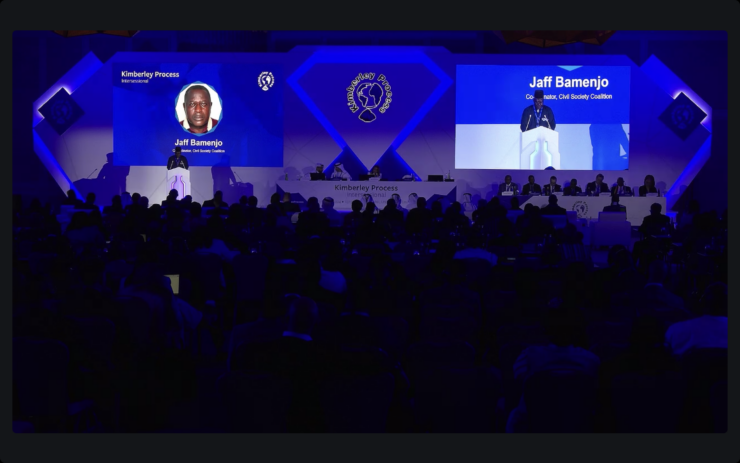Civil society opening statement at the 2024 Kimberley Process Intersessional meeting in Dubai
The Civil Society Coalition is drawn in by the KP Chair’s slogan for his current mandate, which has been baptized ‘The year of delivery’. After years of impasse, we sincerely hope this will become more than rhetoric.
As we have consistently repeated in this forum, the Civil Society Coalition stands ready to contribute to making the diamond industry fair and just for all, especially the local communities in or near diamond mining areas, where most of the negative impacts are felt.
Let us start by exploring the KP’s potential to deliver on that endeavor:
The Kimberley Process was created to break the link between the trade in rough diamonds and armed conflict. It is fair to say that the KP certification scheme played a part in resolving some diamond-fueled conflicts in Africa. Today, however, the KP is unable to address, or even only discuss, challenges at the core of its mandate.
It is our firm conviction that KP participants need a change in attitude and mindset if they want to address the current problems confronting this process.
Civil society expresses deep concern over the KP’s failure to seriously assess its role in exacerbating or alleviating ongoing conflicts, in particular, Russia’s aggression against Ukraine and the enduring conflict in the Central African Republic (CAR).
For the past 2.5 years, a small group of participants managed to block any discussion on the use of diamond revenues by Russia to fund its war against Ukraine. Consequently, the G7 countries acted independently to finally advance traceability requirements in the sector. The KP’s failure to provide a forum for discussion and cooperation on this pressing trade issue has significantly contributed to the turmoil and uncertainty currently pervading the supply chain.
The situation of the Central African Republic which has been under a KP embargo since 2013 with a partial lifting in 2016, remains a key concern to the Civil Society Coalition. As the Civil Society Coalition has always pointed out, the unintended consequences of the partial embargo are far-reaching as it now seems to provide an incentive for conflict profiteers through their criminal and smuggling networks, and mercenaries to enter the scene. Civil society strongly contends that both the KP and the CAR government can and should do much more to mitigate the negative impacts of the embargo on artisanal mining livelihoods.
Of course, there is also the seemingly perpetual reform process. An African proverb often resonating in this forum is that: “If you want to go fast, go alone. If you want to go far, go together.” While undeniably valid, it lacks a sense of urgency. The past two decades it has meant that this forum kept kicking the can down the road. Hence, I propose another African proverb to steer our discussions this week: ‘If you close your eyes to facts, you will learn through accidents.’ Let’s acknowledge the fact that the KP requires significant overhaul to credibly uphold its mandate of fostering conflict prevention and sustainable development. Let’s acknowledge the looming risk that without substantial reform, the KP undermines rather than bolsters consumer confidence in diamonds.
The Coalition calls on the KP to embrace a much more comprehensive approach. The Kimberley Process should not just be about banning diamonds funding rebel groups but also about harnessing diamond mining to drive development and enhance the economic, social, and physical well-being of communities.
The present reform cycle should not be another tick-box exercise. It should be grasped as an opportunity to address critical issues associated with diamond mining such as human rights violations, environmental rights, labor rights, fight against money laundering etc.
The KP’s Frame 7 Declaration recognizes that addressing these issues is part and parcel of responsible diamond sourcing. This is a starting point. To give body and credibility to this recognition, the KP CSC urges Participants to integrate Frame 7 in the core of its mandate and in the peer review mechanism. If the KP is to achieve “greater efficiency”, as the Chair has put, the lenient and box-ticking peer review process should evolve into a transparent and robust mechanism that ensures progressive country improvement in critical areas.
The KP Civil Society Coalition applauds the fact that community representatives were able to share their experiences during the Panel of evidence session to reflect on the evolved nature of conflict.
These community representatives live the problems that we sometimes only theorize. When things go wrong, it is communities that face violence and human rights violations. When things go well, they should be the main beneficiaries. The KP should be there for them. The inclusive panel of evidence experience with community participation is an example to pursue and build upon.
KP Participants and Observers, let me end on this positive note. The KP Secretariat is now a reality with its seat in Botswana and an Executive Secretary appointed. We congratulate Mr. Tang and wish him luck.
The Civil Society Coalition is looking forward to constructive discussions and not sterile fights during this intersessional.

Jaff Bamenjo
Civil Society Coalition Coordinator
info@kpcivilsociety.org







